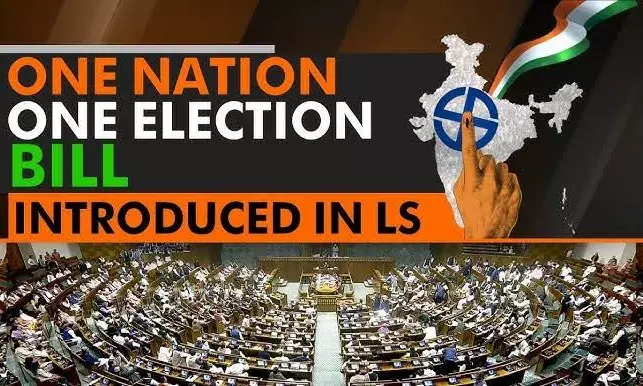A Trojan Horse - One Nation, One Election: A Trojan Horse for Political Centralization
One Nation, One Election bill, heralded by the ruling party BJP as a landmark reform aimed at revolutionizing India’s electoral system.;

On December 17, 2024, the Lok Sabha witnessed the introduction of the One Nation, One Election bill, heralded by the ruling party BJP as a landmark reform aimed at revolutionizing India’s electoral system. While the proposal promises efficiency, cost savings, and streamlined governance, a deeper critique reveals a more complex, politically motivated agenda that risks undermining India's federal structure, democratic vibrancy, and the sanctity of local issues.
The BJP's push for this bill appears rooted in its reliance on the immense popularity of a singular leader whose image has been meticulously cultivated by deploying humongous amount of money and psychological strategies. This popularity has been bolstered by mass distribution of freebies, such as free rations to over 80 crore people, and divisive narratives that exploit religious fault lines. The Netflix documentary The Social Dilemma offers insights into how digital platforms can be manipulated to influence minds—a tactic seemingly employed to amplify these narratives and consolidate electoral gains.
In national elections, such strategies have proven effective, enabling the BJP to secure consecutive victories. However, state and local elections often prioritize regional issues, where such tactics lose their efficacy—especially in states with higher literacy rates and a more evolved, discerning electorate. The BJP’s inability to replicate its national success at the state level underscores the party’s vested interest in synchronizing elections, thereby diluting the impact of regional concerns and capitalizing on a consolidated national narrative.
The current BJP government, often accused of fostering crony capitalism, has amassed unprecedented wealth through questionable practices. This financial power has been weaponized to topple democratically elected state governments via horse trading and bribery. The party’s extensive resources, derived from its nexus with industrial magnates like Adani and Ambani, have also silenced dissenting voices and co-opted mainstream media. Internationally, the party’s corruption and authoritarian tendencies have drawn criticism, tarnishing India's democratic image. Domestically, however, dissent remains suppressed under a cloud of media bias and fear.
Against this backdrop, the One Nation, One Election proposal emerges as a strategic ploy to consolidate the BJP's diminishing popularity. By merging state and national elections, the party aims to ride on its fabricated national image, obfuscating local grievances and leveraging its centralized propaganda machinery to dominate the political discourse.
While the BJP justifies the proposal on grounds of efficiency and cost reduction, its own electoral spending contradicts these claims. The party’s campaign expenditure—far exceeding that of all other parties combined—exposes its lack of moral authority to preach fiscal prudence. The assertion that synchronized elections will save public money is overshadowed by the ruling party’s lavish spending, which is often funded indirectly by public resources through its corporate allies. Moreover, the argument of governance efficiency is undermined by the BJP’s own practices. Frequent elections may disrupt governance temporarily, but they ensure accountability and prevent complacency. By removing this mechanism, One Nation, One Election could allow ruling parties to evade scrutiny, compromising long-term democratic health.
India’s federal system thrives on the autonomy of states, allowing diverse regional voices to find representation. Synchronizing elections risks overshadowing state-level issues with national narratives, marginalizing regional parties and weakening federalism. This is particularly alarming in a country as diverse as India, where local concerns—be it farmers in Punjab, weavers in Tamil Nadu, or fishermen in Kerala—often differ starkly from national priorities.
Studies show that simultaneous elections significantly increase the likelihood of voters choosing the same party at both state and national levels. This homogenization undermines regional parties, many of which are critical for addressing local issues and maintaining a balance of power. The BJP’s dominance in national elections, achieved through divisive and often misleading narratives, could effectively silence these voices, eroding India’s democratic fabric.
The One Nation, One Election proposal is less about electoral reform and more about political centralization. Behind its facade of efficiency and cost savings lies a calculated attempt to entrench power, suppress dissent, and undermine regional autonomy. While the BJP’s propaganda machinery may tout this as a transformative reform, the reality is far more insidious.
India’s democracy, built on the principles of diversity, accountability, and federalism, must resist such attempts at centralization. Rather than overhauling the electoral system to serve partisan interests, incremental reforms that address genuine concerns—such as reducing the duration of the Model Code of Conduct—could achieve efficiency without jeopardizing democratic integrity. As the debate unfolds, it is imperative for citizens and opposition parties to challenge this proposal and safeguard India’s pluralistic democracy from becoming a victim of political expediency.
Suresh Tripathi, Advocate
advocatesuresh@sureshtripathi.in

